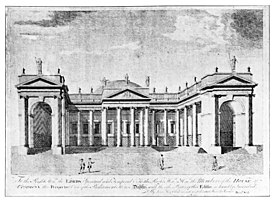Irish Parliament House
| Parliament House | |
|---|---|
|
Native name Irish: Tigh Pharlaimint |
|

Drawing of the front of Parliament House with the dome, seen from street-level, in the 18th century
|
|
| Location | College Green, Dublin |
| Built | 1729 |
| Rebuilt | 1796 |
| Architect | Edward Lovett Pearce, James Gandon |
| Architectural style(s) | Palladian architecture |
| Owner | Bank of Ireland |
Parliament House (Irish: Tigh Pharlaimint) in Dublin, Ireland, was home to the Parliament of Ireland, and now houses the Bank of Ireland. It is located at College Green.
Construction started in 1729 and it was the world's first purpose-built two-chamber parliament house. The building was home to the two Houses of Parliament (Irish: Tithe na Parlaiminte), serving as the seat of both chambers (the Lords and Commons) of the Parliament of the Kingdom of Ireland for most of the 18th century until that parliament was abolished by the Act of Union of 1800, when Ireland became part of the United Kingdom of Great Britain and Ireland.
The current parliament building is Leinster House.
In the 17th century, parliament settled at Chichester House, a town house in Hoggen Green (later College Green) formerly owned by Sir George Carew, Lord President of Munster and Lord High Treasurer of Ireland, which had been built on the site of a nunnery disbanded by King Henry VIII at the time of the dissolution of the monasteries. Carew's house, named Chichester House after its later owner Sir Arthur Chichester, was already a building of sufficient importance to have become a temporary home of the Kingdom of Ireland's law courts during the Michaelmas law term in 1605. Most famously, the legal documentation facilitating the Plantation of Ulster had been signed in the house on 16 November 1612.
...
Wikipedia

